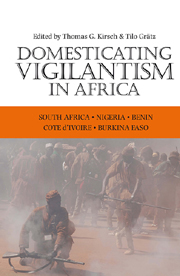Book contents
4 - Vigilantes in War
Boundary Crossing of Hunters in Burkina Faso & Côte d'Ivoire
Published online by Cambridge University Press: 05 April 2013
Summary
Introduction
Throughout the 1990s hunters' movements emerged in several West African countries – notably Burkina Faso, Côte d'Ivoire, Guinea, Mali and Sierra Leone. These movements combine the traditional basis of hunting (dozoya), involving the hunting of game and secret knowledge and initiation into the cult of hunters, with the confrontation of present-day sociopolitical problems, such as insecurity, theft and war.
In the two countries covered in this chapter (Burkina Faso and Côte d'Ivoire), these sociopolitical challenges and the responses of hunters' movements to them differ. On the one hand, in Côte d'Ivoire in the 1980s, gangsters, coupeurs de route and other criminals controlled rural areas and roads to such an extent that gendarmes and police officers appeared powerless. In reaction to this situation, hunters' associations in villages in northern Côte d'Ivoire grew in importance and formed vigilante groups to protect the inhabitants of the district from criminal activity. In Burkina Faso, on the other hand, the hunters' association Benkadi emerged as an anti-Fulbe association. This association protected villagers against theft and insecurity, but in doing so it simultaneously promoted a supra-ethnic identity of farmers that transcended certain ethnic and territorial boundaries in opposition to so-called ‘outsiders’ or ‘strangers’ like Fulbe and Mossi (Hagberg 2000, 2004b).
- Type
- Chapter
- Information
- Domesticating Vigilantism in Africa , pp. 98 - 117Publisher: Boydell & BrewerPrint publication year: 2010

